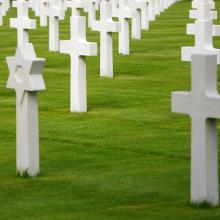gang violence
The Department of Homeland Security announced on Monday that it would terminate the temporary protected status for Salvadorans living in the U.S. beginning September 2019, putting 200,000 of them at risk of being sent back to a country with one of the highest murder rates in the world.
Cure Violence is working to “treat” gang membership with a strategic approach that taps into the cycle of violence. They train people in heavily affected communities to detect catalyzing events that lead to joining a gang. The intent is to interrupt individuals’ behaviors before they commit crimes, and continue communicating with them to decrease the likelihood that they and their friends will become involved in gang violence.
With the blessing of Pope Francis, Cardinal Blase Cupich on April 4 unveiled an anti-violence initiative for this beleaguered city that will be underscored by a Good Friday procession, using the traditional stations of Jesus’ way to the cross to commemorate those who have lost their lives in street violence.
Cupich said he was inviting civic, education, and religious leaders, and “all people of good will,” to take part in the April 14 “Peace Walk” through the heart of the violence-scarred Englewood neighborhood.
Over the last few years we have heard much about the school to prison pipeline. According to the ACLU, it is:
a disturbing national trend wherein children are funneled out of public schools and into the juvenile and criminal justice systems. Many of these children have learning disabilities or histories of poverty, abuse or neglect, and would benefit from additional educational and counseling services. Instead, they are isolated, punished and pushed out.
The Children’s Defense Fund argues that because of a lack of early childhood education and healthy beginnings, this epidemic begins before a child is old enough to enroll in school, defining the problem as the Cradle to Prison pipeline. Organizations such as the Advancement Project, the Legal Defense Fund, and many others too have defined the school-to-prison pipeline as just another level to the mass incarceration epidemic and one of the most disturbing injustices we face today.
We know that the pipeline is undergirded by Zero Tolerance policies, mass expulsions, unprecedented school arrests, inadequate school funding, and myriad other unjust policies that either criminalize our children or rob them of the resources they need to be successful. We also know that high-school dropout is certainly a station on the pipeline. In many urban centers the dropout rate hovers around 50 percent, and some data suggests 7,000 students drop out of school every day. What happens to kids that drop out of school? Where do kids who are expelled end up?
For many pastors of urban congregations, “stepping up” to end gun violence stems from a very personal place — as they have been forced to bury their own neighbors and church members. According to Samuel Rodriguez, gun violence – especially in urban areas – deeply affects interfaith leaders there, who are declaring violence-free zones and taking action.
Faith-based leaders in Philadelphia and Chicago have rallied to fight gun violence. Heeding God’s Call, based in Philadelphia, holds prayer vigils at the locations of gun homicides as well as organizes gun-store campaigns that ask gun store owners to sign a code of conduct.
In Chicago, All Saints Episcopal Church organized CROSSwalk, a walk through downtown Chicago, which drew a few thousand people the past two years. Violence on Chicago streets has killed more than 800 young people in the last six years.
Nuenke addressed breaking the chain of violence and pain that we see in every community. He quoted 2 Corinthians 1:3-4 and Isaiah 61 as examples of God’s compassion and its life-changing, healing power.
“What would happen if the body of Christ more fully was involved in living out Christ’s compassion in a broken world?” Nuenke asked. “Sometimes people who are hurt or experience violence end up hurting other people. The care and compassion they might receive from the Lord Jesus will impact them more in 20-30 years than anything else.”




